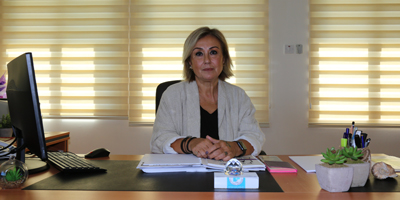EUL Academic Hablemitoğlu discussed “Parent-Child Relationship during Pandemic Process”

Dean of the European University of Lefke (EUL) Health Sciences Faculty Prof. Dr. Şengül Hablemitoğlu shared information on “Parent-Child Relationship During Pandemic”. Hablemitoğlu said, “The pandemic process was a period in which being a parent was questioned and hard days were experienced. It has deeply shaken social life as much as it has affected our health and economic life. This situation seems to continue for a while. She said parents with children of all age groups who continue their education have had a lot of difficulty in this process. She also stated that changing the dates of both the university and high school entrance exams, continuing the education online and spending a long time with their children in the home environment requires being a different parent.
Hablemitoğlu said, “We know that the nature of the school; It consists of many factors such as being a structured environment for education, social relations, and restricting all these between certain times. When homeschooling is done families draw the boundaries and try to implement the educational framework that the school draws at home seems challenging for both parents and parent-child relationships. It seems healthier to maintain an understanding attitude in the family in order not to put too much pressure on children in this regard and in an uncertain period to overcome the process altogether”.
Hablemitoğlu said, “for some families, spending more time together during isolation can bring family members closer together and develop a sense of well-being. However, various factors that are symbolic for the COVID-19 crisis, such as financial insecurity, concerns about the health of family and relatives, uncertainty about the quarantine period, lack of social and physical activities, and boredom, all often have an impact on one’s mood and mental health. Hablemitoğlu pointed out that tensions may occur between parents, adolescents and their children because families face more daily challenges (e.g. job loss or economic problems, disconnection from the school environment) and additional tasks (e.g. parents following their children’s education at home, taking care of their children).
Hablemitoğlu: Some people can tolerate uncertainty, while others have difficulty tolerating uncertainty.
An important aspect of unforeseen stressful situations is uncertainty such as the COVID-19 pandemic. Uncertainty is one of the main determinants of experienced stress. Moreover, families’ ability to cope with uncertainty varies greatly during this process. Some people can tolerate uncertainty, while others have trouble tolerating uncertainty and try to avoid it. Hablemitoğlu said intolerance to uncertainty is defined as the tendency to perceive any uncertain situation negatively, regardless of its probability and consequences, and to respond with stress and tension. She emphasized that the worldwide COVID-19 epidemic affects daily life for all people and it is impossible to escape from uncertainty. She stated that as parents’ intolerance of uncertainty increases, their parenting behaviour is negatively affected.
Hablemitoğlu: We can continue this process more comfortably by loving our children, respecting their personal limits and showing that we value them.
Hablemitoğlu continued: “I would like to remind of something to the parents first. Every individual has a different rhythm in life, whether a child or an adult. Especially, being able to communicate with the alpha generation born after 2010 is very different. Therefore, even if our children take their parents as a model, their lives will be different as they will interpret them from their own perspective. There is a high probability of training going online in the coming months. This situation will change home life. Parents can start by exploring flow of their child’s life. It is important to observe rather than interfere with their children and let them do what they want. First, they can search for answers to the following questions; What time does s/he wake up? Does s/he take care of his personal care? Does s/he spend time in pyjamas all day? Does s/he change his/her clothes? Does s/he tidy up his bed / room? Is s/he awakening himself/herself? Are you waking up him/her? Does s/he attend his/her classes? Does s/he deliver his/her homework on time? How is his/her relationship with digital devices, how many hours a day does s/he spend on phone / television / electronic games? In short, every parent has to know the flow of home life with their child. Afterwards, if s/he has an observation that will affect the success and health of the child in this flow, s/he must first respect the flow of life of the child by explaining it and then find a middle way. Especially adolescence is a period when communication is not easy. It is important to speak plainly and to be sincere. A solution may be to ask the child how s/he can correct the situation or what s/he wants to do, to help his/her plan, and to offer support by listing the situations that need to be managed better. It will be easier for children to be motivated if they know that they are supported, understood, trusted and solved instead of being criticized, blamed or judged. We can continue this process more comfortably by loving our children, respecting their personal limits and showing that we value them. It will be possible to overcome the problems when we do not see our children as an extension of ours and accept their existence as individuals, by showing that we love them respectfully without giving our children a message of success and love,” she said.
